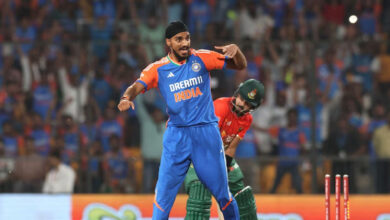World Chess Championship: Of minds doing strange things, body language interpretations and cameras in players lounge

After nearly five hours and 49 moves, Russia’s Ian Nepomniachtchi and China’s Ding Liren agreed that Game 1 of the 2023 world chess championship should end in a draw. It was a result that would surprise no one, considering that since the 2012 event all the first games in six world championship contests have ended in draws.
There was a lot, however, that happened over the board.
When Ding’s mind did ‘strange things’
China’s Ding had told the FIDE website before the contest started that he felt no pressure about playing in the world championship. “I am confident about my preparation. I grew up, I matured a little bit, so I can handle the pressure. I don’t feel nervous right now,” he said.
However, when the first game started on Sunday, his mind started ‘acting up’. He consequently spent a lot of time in his private player lounge where he was seen huddled under a puffer jacket, which he attributed to “feeling cold due to anxiety”.
“I’m not happy with the way I played. I’m a bit depressed,” Ding admitted at the post-match press conference. “I didn’t think about chess so much at the start of the game. My mind was very strange. Had many feelings and many memories. Strange things happened. I thought maybe there was something wrong with my mind. Maybe it was the pressure of the match.”
His pre-match preparation also has not gone to plan, he admitted. He said he had to change his hotel, the St Regis in Astana where the event is also happening, just a day before game 1 as the room ‘felt bad’.
Interpreting body language
At some point during the game, as Ding retreated to his private player lounge, his Russian rival sunk into his chair on the main stage contemplating his next move. There was a definite sense in the air that he had squandered an advantage against Ding.
Five-time champion Viswanathan Anand, who was in the commentary box remarked: “I think in general we can conclude that Ian’s body language is going to be a bit more revealing than Ding Liren’s. Ding really is a zen (player).”
Eight-time US Women’s Champion Irina Krush, who was sharing commentary duties, then asked Anand about body language in chess, in particular his one-time nemesis Garry Kasparov, and how he stayed unaffected the Russian’s body language while playing him.
“It was difficult because typically it was backed up good moves. He liked to dramatise, but I don’t think he ever went out of his way to mislead. If he did things with his body language, it usually meant either you had messed up or he had. He would shake his head vigourously or something. It was annoying. But you learnt to block it out. The Garry stuff was frightening, because it was actually backed up good moves,” Anand said before talking about the things he had seen in other rivals across the board.
“With Kasparov it was clear when he thought he was winning… there were some things you knew there was a translation for: If he removed his watch and put it back on, the game is about to be finished. Not a good sign. With Magnus (Carlsen), you just get an eye roll, but not a full on reaction.
“Karpov had this habit of calculating with his fingers or calculating lines with his lips. He would literally say the moves to himself. And under time pressure he would make it seem like he was calculating faster. You watched his fingers for signs of nervousness. With Garry, it was just on his face,” he said.
‘Camera trouble’
As they contemplated their next move, both contenders found peculiar ways of being alone with their thoughts.
Ding spent a lot of his time in his player lounge watching his opponent on the TV screen. Nepo spent a lot of time pacing around the main stage or making faces at the chessboard.
On social media, some players wondered if cameras actually belong inside the private players’ lounge.
Danish chess player Peter Heine Nielsen tweeted, “Are the players aware that they are being filmed in the rooms where they are resting? This happened in New York 2016, and was stopped immediately, as the feed was only supposed to be for the arbiters, not for the public.”
At this point, Chief Marketing & Communications Officer for FIDE, David Llada, replied that cameras being in the room was in the contract given to players for the match for the event, and it was accepted both players.
While other chess players and analysts weighed in on the pro and cons of having camera access inside private lounges of players, the sight of Ding wearing a puffer jacket did inspire a lot of memes and jokes on social media.







